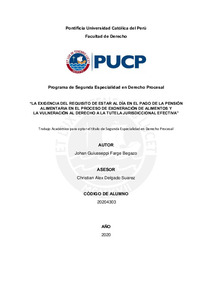| dc.contributor.advisor | Delgado Suárez, Christian Alex | |
| dc.contributor.author | Farge Begazo, Johan Guiusseppi | |
| dc.date.accessioned | 2021-05-10T03:56:53Z | |
| dc.date.available | 2021-05-10T03:56:53Z | |
| dc.date.created | 2020 | |
| dc.date.issued | 2021-05-09 | |
| dc.identifier.uri | http://hdl.handle.net/20.500.12404/19000 | |
| dc.description.abstract | The purpose of this legal article is to demonstrate how to be required in an absolute manner
and without establishing parameters, or exceptions to compliance with the special requirement
contained in article 565-A of the TUO of the Civil Procedure Code, that is, "to demonstrate to
be up to date in the payment of alimony ”, whoever wants the court to extinguish a maintenance
obligation to which they are obliged, violates their right to effective judicial protection, for the
purposes of developing the issue it will be established that they are understood as a right to
judicial protection effective and the regulatory framework in which it is developed, it will also
be taken into account that it is understood by the right to food and who is obliged to grant it,
and then carry out a specific analysis of the specific causes on which the claim can be sustained.
of exemption of alimony, which are established in article 483 of the Civil Code, as are the s
following; due to the material inability to continue fulfilling said obligation on the part of the
obligor, in such a way that demanding such fulfillment puts his own subsistence at risk; for
having disappeared the state of need of the obligee and finally when the obligee reaches the
age of majority. Once each specific cause has been established, the parameters or exceptions
for the application of said special requirement will be established at the time of qualifying the
claim, and the judge must in any case via diffuse control, make the right to effective judicial
protection prevail against a formal requirement that limits access to the defendants even a
statement on the merits after carrying out a judicial process where the minimum guarantees are
met to verify and establish on the foundations of the claim. | es_ES |
| dc.description.abstract | El presente artículo jurídico tiene por finalidad demostrar como el exigir de manera
absoluta y sin establecerse parámetros, ni excepciones, al cumplimiento del requisito especial
contenido en el artículo 565-A del T.U.O del Código Procesal Civil, esto es “demostrar estar
al día en el pago de la pensión de alimentos”, de quien pretenda que el órgano jurisdiccional
extinguida una obligación de carácter alimentaria al cual se está obligado, vulnera su derecho
a la tutela jurisdiccional efectiva, para efectos del desarrollo del presente trabajo, se busca
establecer, que se entienden por derecho a la tutela jurisdiccional efectiva y el marco normativo
en el cual este se desarrolla. Asimismo se analiza que debemos de entender por derecho a
alimentos y quienes están obligados a otorgarlos, realizando un análisis en concreto de las
causales especificas en las cuales se sustentan la pretensión de exoneración de alimentos,
establecidas en el artículo 483° del Código Civil, como lo son las siguientes; por la incapacidad
material de seguir cumpliendo dicha obligación por parte del obligado, de manera tal que
exigirle dicho cumplimiento ponga en riesgo su propia subsistencia; por haber desaparecido el
estado de necesidad del alimentista y por ultimo cuando el alimentista alcanza la mayoría de
edad. Siendo que una vez fijadas cada causal se establecerá cuáles son los parámetros o
excepciones para la aplicación de dicho requisito especial al momento de calificar la demanda,
llegando a la conclusión de que el juzgador en todo caso vía control difuso, deberá hacer
prevalecer el derecho de carácter constitucional a la tutela jurisdiccional efectiva, frente a un
requisito formal que limita el acceso a los justiciables aun pronunciamiento de fondo llevado a
cabo en un proceso judicial donde se cumplan las garantías mínimas para verificarse y
establecerse sobre la fundabilidad de la pretensión. | es_ES |
| dc.language.iso | spa | es_ES |
| dc.publisher | Pontificia Universidad Católica del Perú | es_ES |
| dc.rights | info:eu-repo/semantics/openAccess | es_ES |
| dc.rights.uri | http://creativecommons.org/licenses/by/2.5/pe/ | * |
| dc.subject | Tutela jurisdiccional--Perú | es_ES |
| dc.subject | Manutención (Derecho de familia) | es_ES |
| dc.subject | Pension alimenticia-- Legislación--Perú | es_ES |
| dc.title | La exigencia del requisito de estar al día en el pago de la pensión alimentaria en el proceso de exoneración de alimentos y la vulneración al derecho a la tutela jurisdiccional efectiva | es_ES |
| dc.type | info:eu-repo/semantics/bachelorThesis | es_ES |
| thesis.degree.name | Segunda Especialidad en Derecho Procesal | es_ES |
| thesis.degree.level | Título Profesional | es_ES |
| thesis.degree.grantor | Pontificia Universidad Católica del Perú. Facultad de Derecho | es_ES |
| thesis.degree.discipline | Derecho Procesal | es_ES |
| renati.advisor.dni | 43234974 | |
| renati.advisor.orcid | https://orcid.org/0000-0001-5629-8609 | es_ES |
| renati.author.dni | 42646677 | |
| renati.discipline | 421109 | es_ES |
| renati.level | https://purl.org/pe-repo/renati/level#tituloSegundaEspecialidad | es_ES |
| renati.type | https://purl.org/pe-repo/renati/type#trabajoAcademico | es_ES |
| dc.publisher.country | PE | es_ES |
| dc.subject.ocde | https://purl.org/pe-repo/ocde/ford#5.05.01 | es_ES |






